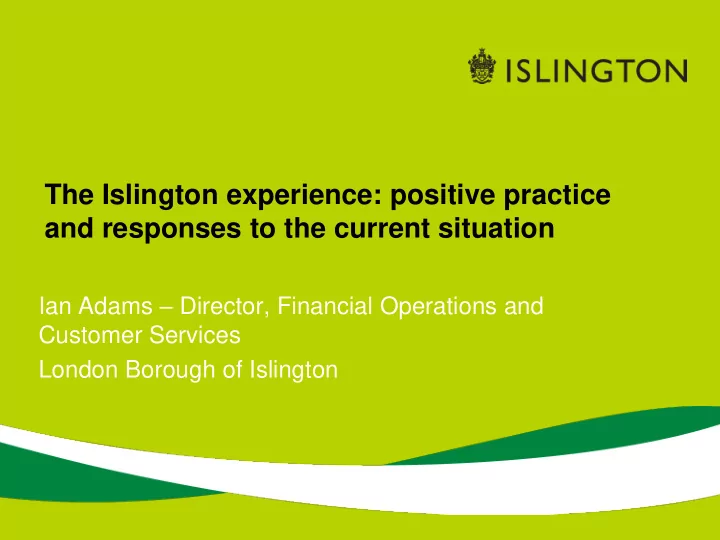

The Islington experience: positive practice and responses to the current situation Ian Adams – Director, Financial Operations and Customer Services London Borough of Islington
Resident Support Scheme • Partnership between Cripplegate and Islington Council. • Combined several funds – local welfare provision (social fund – crisis, community care) discretionary housing payments, council tax hardship, Cripplegate. This allows us to ensure that funds are directed appropriately rather than them being accessed independently without any real connection. • RSS accessed by recommenders who are already assessing need and make a direct recommendation based on their knowledge. Referrers who see clients and apply for support on their behalf.
What we could see Cripplegate had • Expertise in grant giving linked to personal need • Relationship with the voluntary sector • Different reputation with clients • Connection with local people • Wider additional aims that we can link in to • Funds already used for a similar purpose to the social fund • Existing infrastructure and relationships
What the Council has • Strategic aims and responsibility across a range of need • Reach – to a wide range of residents • Access to data including from the DWP • Access to wider funds to meet need • Current infrastructure to enable new processes • Members very interested in and involved in the Cripplegate model and indeed in engagement with the third sector • A need based resident focused approach. We want to find solutions to issues such as welfare reform and debt.
Fears from both sides • Reputation of Cripplegate. Will they be seen as an arm of the Council? • Independence – retaining of identity • Ability to maintain control • The impact of welfare reform • Capacity to cope with volumes – crisis • Data poor from DWP • Not all Council funds included some concern about opening up decision making.
Opportunities • Meeting need through the one approach, sharing data, processes etc really does work. It is often different money but the same people with the same need. • The combining of funds enables more to be done with limited resources • Cripplegate have been enabled to become even more closely involved and in a position to influence the strategic direction of the Council • Additionality is the real PRIZE. We can seek to meet the whole need of a person and provide a sustainable way forward not just the presenting problem. • We can use funds proactively – St Sepulchre disability project
Outcomes For 14/15 (end of February) • Resident Support Scheme awards 5069 • DHP £1.27m Community Care £1.31m Crisis £11,000 • Cripplegate and St Sepulchre £83,000 • Additional support 1,011 – 46% debt and money advice, 17% employment support, 19% energy support, 14% Credit Union • Male 34% female 66% • Of those supported with children – 85% are single • Homelessness 16% Disability or long term limiting health 36% Mental Health 15% Dependent children/pregancy related need 19% • White British 42% (48%) , Black or Black British (African) 12% (6%), Black or Black British (Caribbean) 12% (4%)
Why we challenged the Government • The future funding arrangement was misleading at best • It went against what we felt was promised – important scheme localised • New burdens doctrine • Significant budget cuts • Continuing need – welfare reform • The scheme is working
What we challenged Fundamentally : • The need to consult • The need to fulfil their Equality Duty Supported by: • Evidence of a lack of transparency • Evidence of contradictory statements • Evidence of impact
The challenge continued • The Government signed a court settlement agreeing to consult and to fulfil their Equality Duty • The Consultation document was hugely disappointing – misleading • We issued a legal letter reserving our right to take future action • Keep the Safety Net campaign very significant • The consultation outcome led to a further period of consultation related to the Local Government Finance Settlement • The government agreed to allocate £74m – albeit badged slightly differently
The way forward • We have £0.56m. Was £1.44m • Discretionary Housing Payments reduced from £1.85m in 13/14 to £0.99m in 15/16 • We have agreed to make LWPF up to £1.44m for 15/16 only • We will need to adapt the scheme accordingly this year ………………………………………………………………….. • Will LWPF be axed after May? • Will there be even more hard hitting welfare reform? • What will be the impact of universal credit – national expansion? • We will need to muster up all our creativity to retain a safety net going forward.
Recommend
More recommend